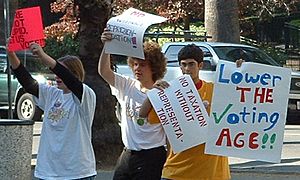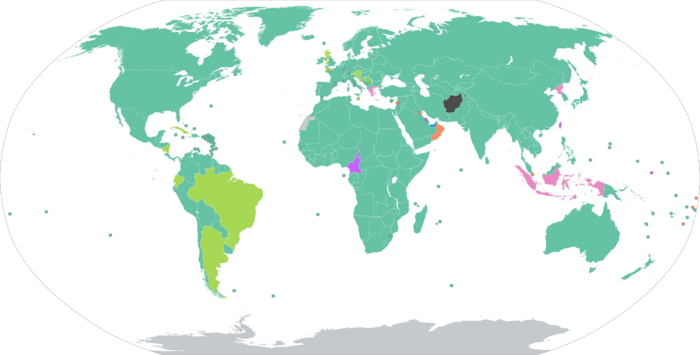Voting age facts for kids
A legal voting age is the youngest age a person can be to vote in a country's elections. Most nations allow people to vote when they are 18 years old. However, some countries set the age at 16 or 17, while a few others have it at 20 or 21. For example, in the United Arab Emirates, members of the electoral college must be 25 to vote.
History of Voting Ages
Before the 1900s, most countries required people to be 21 years old or older to vote. In 1890, the South African Republic was one of the first places to set its voting age at 18. This was partly an effort to give more power to certain groups of people.
During World War II (1939–1945), many young people under 21 were fighting in wars. This led to arguments that if they were old enough to fight for their country, they should be old enough to vote. The U.S. state of Georgia lowered its voting age to 18 in 1943, and Kentucky followed in 1955. In 1946, Czechoslovakia became the first country to nationally reduce its voting age to 18. By the 1970s, many major democratic countries, especially in Europe and North America, lowered their voting ages to 18. This started with the United Kingdom in 1969, followed by Canada, West Germany (1970), the United States (1971), Australia (1974), and France (1974). By the end of the 20th century, 18 had become the most common voting age around the world. Countries like Japan, India, Switzerland, Austria, and Morocco also lowered their voting age to 18.
Debate on Lowering the Voting Age
Many people believe the voting age should be lowered even further, often to 16. They argue that young people are informed about important issues and care about their future.

In Brazil, the voting age was lowered to 16 in the 1988 Constitution. In Europe, some States of Germany started allowing 16-year-olds to vote in local elections in the 1990s. Austria became the first country to allow 16- and 17-year-olds to vote in national elections in 2007. Studies showed that these young voters were just as capable as older voters in understanding politics and making choices. They also showed more trust in democracy. Many proposals to lower the voting age to 16 have been made in other countries, including the United States, Canada, and Australia. Young activists, especially those involved in climate movements, have also strongly supported lowering the voting age.
Countries with Different Voting Ages
Let's look at some examples of countries that have changed their voting age:
Australia
South Australia lowered its voting age from 21 to 18 in 1973. In 2019, a bill was introduced in the Australian Parliament to lower the voting age to 16, but it did not pass.
Austria
Austria lowered its voting age for all elections to 16 in 2007. This made it the first country in the European Union to do so. Before this, some Austrian states had already lowered the voting age to 16 for local elections. This change encouraged more young people to get involved in politics.
Brazil
Brazil lowered its voting age from 18 to 16 in its 1988 constitution. The first presidential election where 16-year-olds could vote was in 1989. In Brazil, voting is required for citizens between 18 and 70 years old, but it is optional for 16 and 17-year-olds.
Canada
Canada lowered its federal voting age from 21 to 18 in 1970. Most Canadian provinces soon followed this change. In recent years, there have been efforts to lower the federal voting age to 16. In 2021, a group of young people filed a court challenge, arguing that the 18-year-old voting age is unfair. However, a bill to lower the age to 16 was defeated in Parliament in May 2022.
Germany
In 2021, the German government agreed to lower the voting age for European elections to 16. This change was in effect for the 2024 European Parliament elections. They also aimed to lower the voting age for national elections, but this requires a change to the country's main rules (the constitution), which has not yet happened. Several German states already allow 16-year-olds to vote in state and local elections.
Malta
Malta lowered its voting age from 18 to 16 for local elections in 2013. In March 2018, the Maltese Parliament unanimously voted to change the constitution. This lowered the voting age to 16 for all national elections, European Parliament elections, and referendums. This made Malta the second EU country to adopt a 16-year-old voting age for all purposes.
New Zealand
In November 2022, the Supreme Court of New Zealand ruled that the voting age of 18 was unfair because it discriminated based on age. The Prime Minister at the time announced that a bill to lower the voting age to 16 would be debated in parliament. However, this bill was later withdrawn in January 2024 after a new government was elected.
United Kingdom
The United Kingdom lowered its voting age from 21 to 18 in 1969. There has been a strong campaign to lower the voting age to 16 in the UK. In Scotland, the voting age was lowered to 16 for the 2014 Scottish independence referendum and later for Scottish Parliament and local government elections. In Wales, the voting age was lowered to 16 for Senedd (Welsh Parliament) elections in 2021 and for local elections in 2022. For UK general elections, the voting age remained 18. However, in July 2025, the government announced plans to reduce the minimum voting age for all elections in the UK to 16 by the 2029 general election.
United States
The debate about lowering the voting age from 21 to 18 in the United States became very strong during the Vietnam War. Many young soldiers were old enough to fight but not old enough to vote. This led to the 26th Amendment in 1971, which set the national voting age at 18. Today, some states allow 17-year-olds to vote in primary elections if they will turn 18 by the general election. Several cities and towns, like Takoma Park, Maryland, have lowered their voting age to 16 for local elections. Some people have also suggested raising the voting age to 25, unless a person serves in the military, works as a first responder, or passes a civics test. This idea would require a change to the U.S. Constitution.
Maximum Voting Age
While most discussions are about the youngest age to vote, there are rare discussions about a maximum voting age. The only place with a maximum voting age is the Vatican City State. Cardinals must be under 80 years old to vote for a new Pope.
Voting Ages Around the World
Most countries have a voting age of 18. However, some countries allow people to vote at 16 or 17. Examples include Argentina, Austria, Brazil, Cuba, Ecuador, Nicaragua, East Timor, Greece, and Indonesia.
See also
 In Spanish: Edad para votar para niños
In Spanish: Edad para votar para niños
- Age of candidacy
- Age of majority
- Suffrage
- Youth rights
- Youth suffrage
 | Kyle Baker |
 | Joseph Yoakum |
 | Laura Wheeler Waring |
 | Henry Ossawa Tanner |


